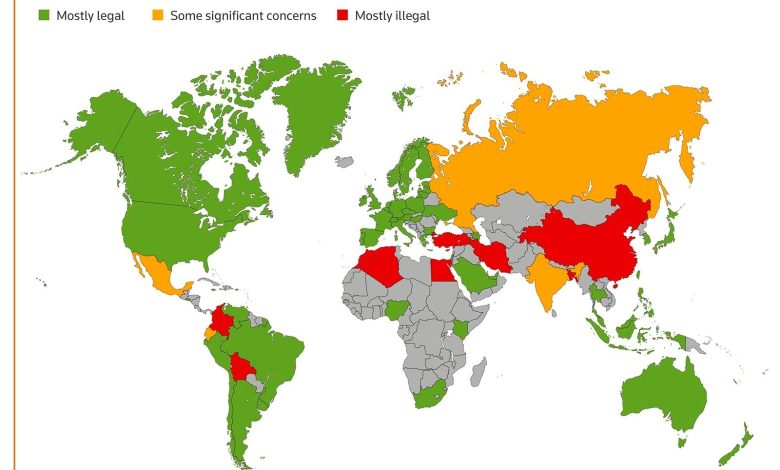The Global Landscape of Cryptocurrency Regulation: An Overview

- Understanding the Varied Approaches to Cryptocurrency Regulation Around the World
- The Impact of Regulatory Clarity on the Growth of the Cryptocurrency Market
- Challenges Faced by Governments in Regulating Cryptocurrencies
- Key Players in the Global Cryptocurrency Regulation Landscape
- Emerging Trends in Cryptocurrency Regulation
- The Role of International Organizations in Shaping Cryptocurrency Regulations
Understanding the Varied Approaches to Cryptocurrency Regulation Around the World
Cryptocurrency regulation varies significantly around the world, with different countries taking diverse approaches to overseeing this emerging technology. Some nations have embraced cryptocurrencies, viewing them as a valuable asset class, while others have been more cautious, implementing strict regulations to mitigate risks.
In the United States, for example, the regulatory landscape for cryptocurrencies is complex, with multiple agencies sharing oversight responsibilities. The Securities and Exchange Commission (SEC) treats certain cryptocurrencies as securities, subjecting them to stringent regulations. On the other hand, the Commodity Futures Trading Commission (CFTC) considers cryptocurrencies as commodities, regulating them accordingly.
In contrast, countries like Japan have taken a more proactive approach to cryptocurrency regulation, recognizing Bitcoin and other digital assets as legal tender. Japan has established a licensing system for cryptocurrency exchanges to ensure compliance with anti-money laundering (AML) and know your customer (KYC) regulations.
On the other hand, China has imposed a ban on initial coin offerings (ICOs) and cryptocurrency trading, citing concerns about financial stability and capital outflows. The Chinese government has cracked down on cryptocurrency mining operations, forcing many to shut down or relocate to more crypto-friendly jurisdictions.
Overall, the global landscape of cryptocurrency regulation is diverse and constantly evolving as policymakers grapple with the challenges and opportunities presented by this disruptive technology. It is essential for stakeholders in the cryptocurrency industry to stay informed about regulatory developments in different jurisdictions to navigate this complex regulatory environment effectively.
The Impact of Regulatory Clarity on the Growth of the Cryptocurrency Market
Regulatory clarity plays a crucial role in shaping the growth trajectory of the cryptocurrency market. When regulators provide clear guidelines and rules for the operation of cryptocurrency exchanges and businesses, it instills confidence in investors and users. This confidence leads to increased participation in the market, driving up demand and ultimately fueling growth.
Uncertainty and ambiguity in regulations, on the other hand, can have a stifling effect on the cryptocurrency market. It creates a sense of unease among investors and businesses, leading to hesitancy in engaging with cryptocurrencies. This can result in a slowdown in market activity and hinder the overall expansion of the industry.
By establishing clear regulatory frameworks, governments can help legitimize the cryptocurrency market and attract more institutional investors. Institutional involvement brings in more capital and expertise, further propelling the growth of the market. Additionally, clear regulations can help prevent fraud and illicit activities, making the market safer for all participants.
Overall, regulatory clarity is essential for the sustainable growth of the cryptocurrency market. It provides a solid foundation for businesses to operate, investors to participate, and innovation to flourish. As the global landscape of cryptocurrency regulation continues to evolve, achieving a balance between oversight and innovation will be key to unlocking the full potential of this transformative technology.
Challenges Faced by Governments in Regulating Cryptocurrencies
Regulating cryptocurrencies poses numerous challenges for governments around the world. One of the main difficulties is the decentralized nature of cryptocurrencies, which makes it challenging for authorities to monitor and control their use. Additionally, the anonymity provided by many cryptocurrencies makes it difficult to track transactions and identify users, leading to concerns about illegal activities such as money laundering and tax evasion.
Another challenge faced by governments is the rapid pace of technological advancements in the cryptocurrency space. As new cryptocurrencies and blockchain technologies emerge, regulators struggle to keep up with the evolving landscape. This can lead to outdated regulations that are ineffective in addressing current issues and risks associated with cryptocurrencies.
Furthermore, the global nature of cryptocurrencies presents a challenge for governments, as regulations in one country may not be applicable or enforceable in another. This lack of international coordination can create loopholes that allow bad actors to exploit differences in regulatory frameworks across jurisdictions.
In addition, the lack of consensus among governments on how to regulate cryptocurrencies further complicates the issue. Some countries have embraced cryptocurrencies and blockchain technology, while others have taken a more cautious approach or even banned their use altogether. This lack of uniformity can create uncertainty for businesses and investors operating in the cryptocurrency space.
Key Players in the Global Cryptocurrency Regulation Landscape
The global landscape of cryptocurrency regulation is shaped by key players who play a crucial role in determining the rules and guidelines for the use of digital currencies. These key players include regulatory bodies, government agencies, financial institutions, and international organizations. Each of these entities has a unique role to play in shaping the regulatory environment for cryptocurrencies around the world.
Regulatory bodies are responsible for overseeing the use of cryptocurrencies within their respective jurisdictions. They are tasked with creating and enforcing regulations that govern how digital currencies can be bought, sold, and traded. Some of the most prominent regulatory bodies in the cryptocurrency space include the Securities and Exchange Commission (SEC) in the United States, the Financial Conduct Authority (FCA) in the United Kingdom, and the Monetary Authority of Singapore (MAS).
Government agencies also play a significant role in shaping cryptocurrency regulation. These agencies are responsible for developing policies and guidelines that govern the use of digital currencies within their countries. They work closely with regulatory bodies to ensure that the regulatory framework is robust and effective in addressing the unique challenges posed by cryptocurrencies.
Financial institutions are another key player in the global cryptocurrency regulation landscape. These institutions are often at the forefront of efforts to regulate digital currencies, as they are directly impacted by the use of cryptocurrencies in the financial system. Banks, payment processors, and other financial institutions work closely with regulators to ensure that the use of digital currencies complies with existing laws and regulations.
International organizations also play a crucial role in shaping cryptocurrency regulation on a global scale. Organizations such as the Financial Action Task Force (FATF) and the International Monetary Fund (IMF) work to develop international standards and guidelines for the use of digital currencies. These organizations help to coordinate efforts between different countries and ensure that regulations are consistent and effective across borders.
Overall, the global landscape of cryptocurrency regulation is complex and multifaceted, with a wide range of key players working together to shape the regulatory environment for digital currencies. By understanding the roles and responsibilities of these key players, stakeholders can better navigate the evolving regulatory landscape and ensure compliance with applicable laws and regulations.
Emerging Trends in Cryptocurrency Regulation
In recent years, there have been several **emerging trends** in **cryptocurrency regulation** around the world. Governments and regulatory bodies are increasingly recognizing the need to establish clear guidelines for the **use** of **digital currencies** to prevent **fraud** and **illicit activities**.
One of the key trends is the **implementation** of **KYC** (Know Your Customer) and **AML** (Anti-Money Laundering) regulations for **cryptocurrency exchanges** and **wallet providers**. This is aimed at **increasing transparency** and **accountability** in the **crypto** space, as well as **protecting** **investors** from **potential risks**.
Another trend is the **licensing** of **cryptocurrency** **businesses** by regulatory authorities. By obtaining a **license**, **companies** are required to **comply** with certain **standards** and **practices**, which can help **legitimize** the **industry** and **build** **trust** among **consumers**.
Furthermore, there is a growing **focus** on **taxation** of **cryptocurrency** transactions. Many **governments** are **introducing** **tax** **laws** to ensure that **profits** made from **crypto** **trading** are **properly** **reported** and **taxed**. This **move** is **seen** as a way to **regulate** the **market** and **generate** **revenue** for the **government**.
Overall, the **trends** in **cryptocurrency regulation** are **evolving** as **authorities** strive to **strike** a **balance** between **innovation** and **protection**. It is **important** for **stakeholders** in the **crypto** **industry** to **stay** **informed** about these **developments** and **comply** with **regulatory** **requirements** to **ensure** the **sustainability** of the **market**.
The Role of International Organizations in Shaping Cryptocurrency Regulations
International organizations play a crucial role in shaping the regulatory landscape of cryptocurrencies around the world. These organizations, such as the Financial Action Task Force (FATF) and the International Monetary Fund (IMF), provide guidelines and recommendations to countries on how to regulate cryptocurrencies effectively.
One of the main ways in which international organizations influence cryptocurrency regulations is through the development of standards and best practices. These standards help countries create a consistent regulatory framework that can address the unique challenges posed by cryptocurrencies, such as money laundering and terrorist financing. By following these standards, countries can ensure that their regulations are in line with international norms and expectations.
Furthermore, international organizations also facilitate cooperation and coordination among countries when it comes to regulating cryptocurrencies. This collaboration is essential in a globalized world where cryptocurrencies can easily cross borders. By working together, countries can share information and best practices, making it easier to combat illicit activities involving cryptocurrencies.
Overall, international organizations play a vital role in shaping cryptocurrency regulations by providing guidance, standards, and fostering cooperation among countries. Their efforts help create a more consistent and effective regulatory environment for cryptocurrencies, which is essential for their continued growth and adoption on a global scale.





